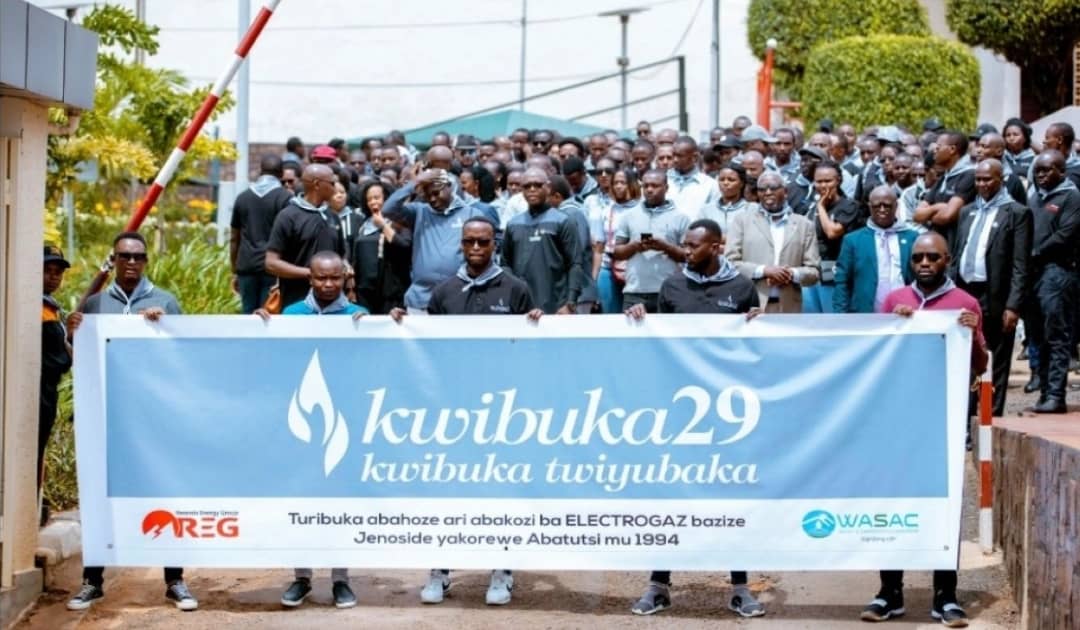On Friday 21st April 2023, Water and Sanitation Corporation (WASAC) and Rwanda Energy Group (REG) remembered former ELECTROGAZ Staff victims of the Genocide against Tutsi in 1994, an event which took place at Kigali Genocide Memorial (KGM).
The commemoration was started by laying wreaths at the memorial built at REG Headquarters, where families and friends of the victims as well as REG and WASAC staff and partners took time to remember and honor the victims of the Genocide against the Tutsi.
After a Walk to Remember from REG to KGM, all participants laid wreaths to pay tribute to more than 250,000 victims of the 1994 genocide buried at the Kigali Genocide Memorial.
During the commemoration, Emmanuel Ntivuguruzwa, a former ELECTROGAZ employee gave a testimony narrating how Tutsis used to face discrimination and how the genocide against the was planned before 1994.
“There were a lot of persecutions at work. Since 1990 when RPA-Inkotanyi launched the liberation struggle, employees who were Tutsi at ELECTROGAZ suffered a lot due to discrimination.
"I had a workmate with whom we shared an office but he always had a sword in the office and was always telling me that he would use it to kill me one day."
Ntivuguruzwa got a job in ELECTROGAZ in 1985 under the support of a man called Katabarwa. But he was later dismissed from the job because he was a Tutsi.
“Although the man supported me to get a job at ELECTROGAZ, I had no good education level because I had a three-year post-primary certificate only. I could not manage to pursue my education due to discrimination in schools.
"However I was performing well. One of the superiors called Donat identified all the Tutsi and dismissed them including me. I became jobless."
“They were burnt being accused of admiring Inkotanyi. This is to show how killings for the Tutsi started earlier. The Tutsi were always threatened, as the employees of ELECTROGAZ were also persecuted including me,” he said.
The former ELECTROGAZ employee also recalled how a crowd of workmates used to threaten the Tutsi by closing doors at work as a way of menacing and forcing them to give up their jobs.
“This is when my fellow worker brought a sword and kept it in our office telling me that he was planning to kill me,” he narrated.
In her remarks, Gisele Umuhumuza, the Ag. CEO of WASAC, said that testimonies like that of the former ELECTROGAZ employee who survived should be a weapon to combat genocide denial.
“We will always remember former ELECTROGAZ staff killed during the genocide. We commit to avoid any discrimination and subdue genocide ideology. We have to back unity and reconciliation efforts to have a bright future,” she noted.
“The former ELECTROGAZ employees who were killed during genocide were contributing to their family and country’s development but were never recognized. We have to honor them and tell them that the trees and branches have flowered again and that is our resilience.” She added
Ernest Nsabimana, the Minister of Infrastructure, said: “This is a tool to combat genocide deniers. The testimonies show how the Tutsi were persecuted long before 1994, either at work or in the community. We have also heard testimonies of how genocide had been tried in different parts of the country. This was due to seeds of bad leadership. We now need joint efforts to fight genocide denial,” he said consoling victims of the 1994 genocide against the Tutsi.
Minister Nsabimana hailed the RPF-Inkotanyi for stopping genocide against the Tutsi and urged the youth to borrow a leaf.


